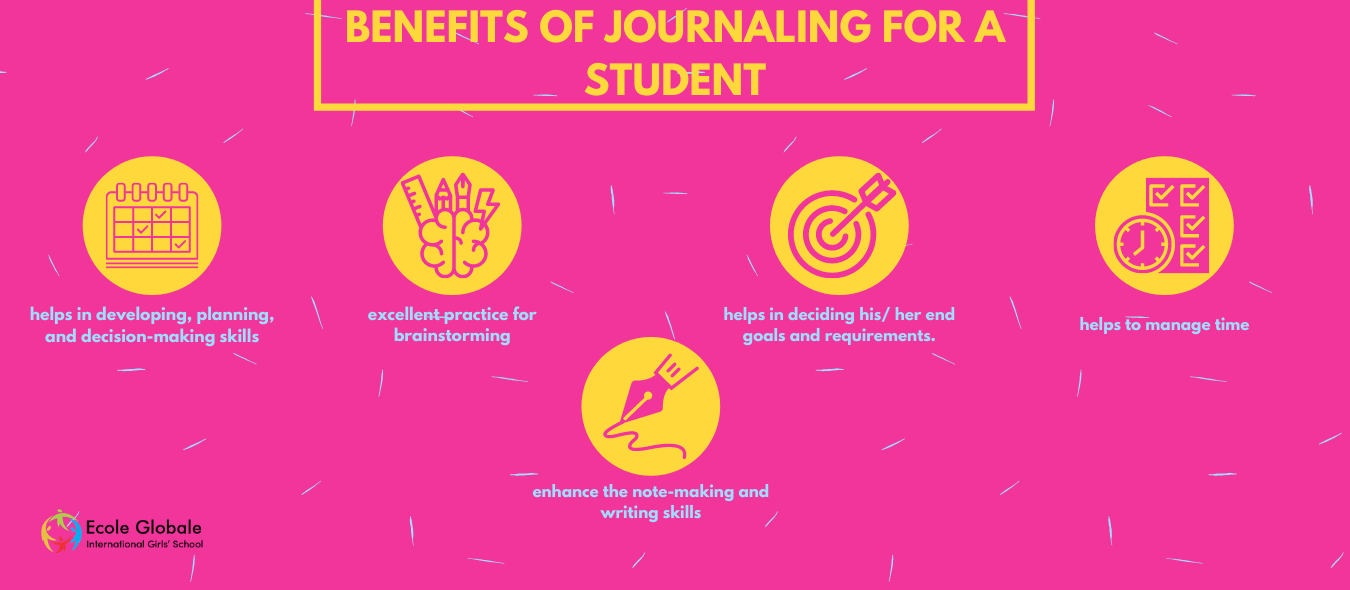Maintaining a record of your activities and goals is considered to be one of the best practices for self -growth, and management. Journaling is one such habit. Writing down the goals and tasks every day motivates one to work on them more willingly. Setting personal goals for oneself is a great practice that journaling offers.
Journaling also has several other benefits that include:-
1) It helps in developing, planning, and decision-making skills.
2) It is an excellent practice for brainstorming and helps a person to plan and think ahead.
3) A person can decide his/ her end goals and requirements.
4) Journaling also helps to manage time. When a person writes down their daily personal goals, they can make their adjustments and complete the tasks as per the deadlines decided.
5) Journaling enhancing the note-making and writing skills of a person.
Writing a diary is also a good practice for noting down your feelings. It is a good practice for self-assessment and future reference. One can analyze their growth through journaling and make informed decisions on various aspects based on previous experiences.
Why Do We Need Journaling
Journaling is an enjoyable and productive activity for people who wish to follow a well-managed lifestyle. It helps in task and time management. Even for individuals who are unsure about their daily-life practices, journaling is a way of bringing your life on track.
For children, journaling can act as high activity. Schools in Dehradun implement such activities in schools that help kids to face problems in interaction with The timid kids who face problems in interaction can write down their thoughts in a diary as an emotional release. This practice will help them in self-reflection and also make them complacent in their surroundings.
If a child is having a problem in dealing with the subjects, then he/ she can also take the help of a journal. Maths journals can prove to help solve problems related to calculations, formulas, etc. Write down your scores, weak points, strong points, and schedule in your journal. This will help in keeping track of the things and provide a reference to the parents for finding out the struggling parts in their child.
In a science journal, a student can note down their experiments and results. New project ideas can also be notes down in this. The science news and events can also be noted down to take inspiration from. Students can also note down their observations and queries in the journal.
Outlet In The Form Of Journaling
For students who have a challenging time expressing their needs orally or deciding choices about various tasks, keeping a journal of their opinions could be an excellent way to assist in learning and developing emotional organization. Even if your kid writes about their activities and experience throughout the day, then journaling can help as a pleasant reminiscing of the events. They can write about their interactions and incidents through which they went throughout the day. Conclusions can be drawn, and analyses can be made.
As an emotional outlet, a diary can prove to be very helpful. There certain things that a person is not complacent about sharing with other people. Such things can be written in a journal. It will lift off the load from your mind and also make you less stressed.
In journaling, imagination has no bounds. One can create scenarios, characters, etc. as there are no rules for journaling. This is one of the best parts of the whole process. You can make mistakes. You can use colors, you can make up your characters and even language! It is a fun activity where one can unleash their creative horses and make the best use of their thought process.
It’s even accepted to write roughly in shorthand. It is a personal notebook, and no one is required to read it and make judgments about the same.
A student might not feel like sharing everything with everyone. But keeping such thoughts in their mind can be troubling. Hence, writing down all these thoughts can act as a superb emotional health moderator. Here are a few ways in which a diary can help the students.
- Explore, manage, and enhance their cognitive skills.
- Release their opinions and disapproval about things in a healthy manner.
- Fear and anxiety can be expressed in a better way.
- A schedule and time- table for the exams can also be maintained along with the problems faced.
- Reflect upon past experiences and make analytics about the same.
- Gain insight and knowledge about one’s perspective of the world.
- Determine the advantages as disadvantages of the situations and learn lessons.
- Plan and prepare for things beforehand.









